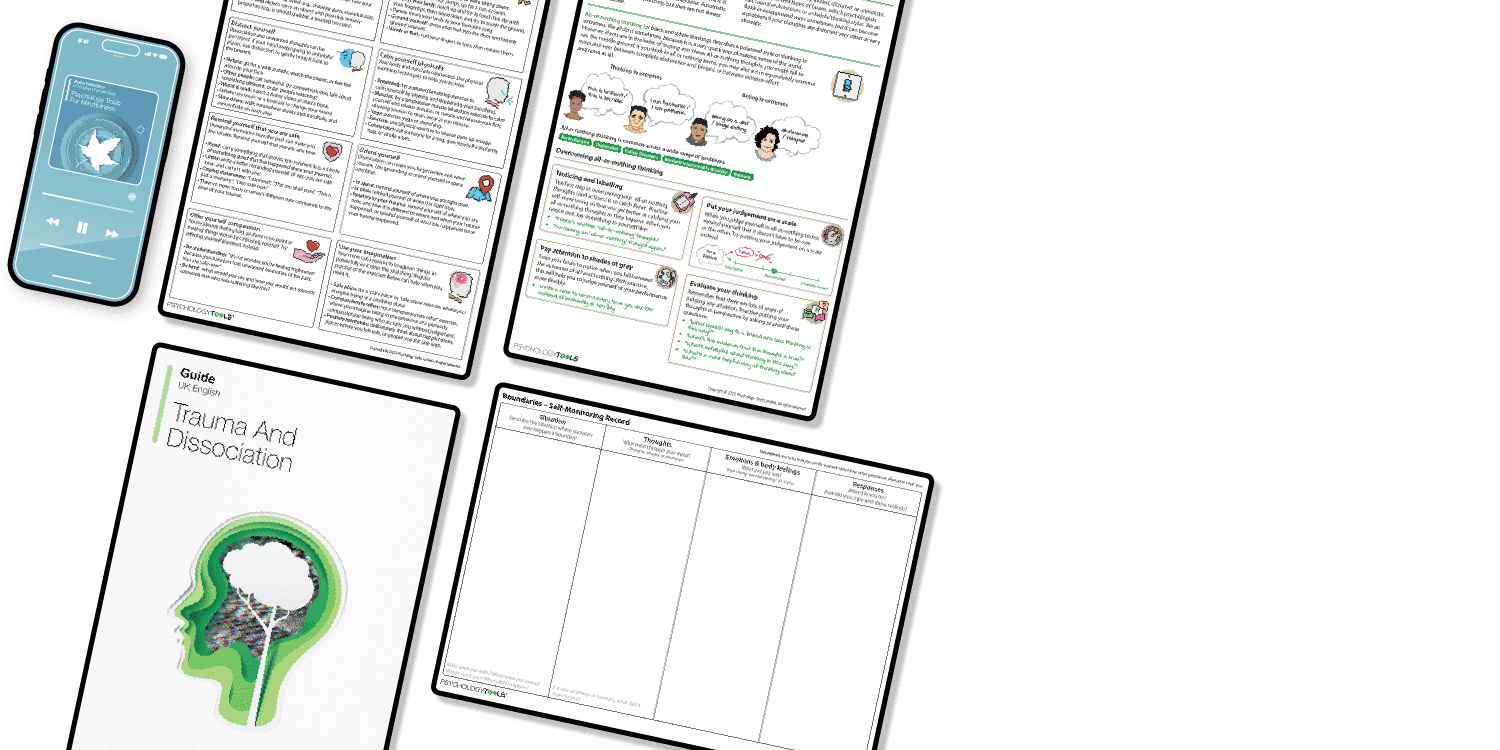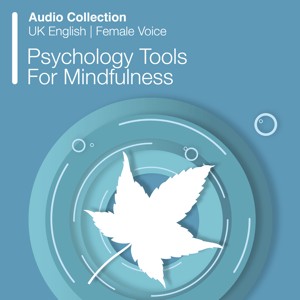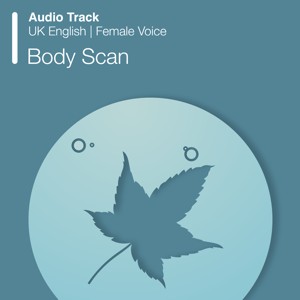Personality Disorders

33 of 33 resources
Cognitive Distortions – Unhelpful Thinking Styles (Common)
Cognitive distortions (or ‘unhelpful thinking styles’) are ways that our thoughts become biased. Different cognitive biases are associated with di ...
https://www.psychologytools.com/resource/cognitive-distortions-unhelpful-thinking-styles-common/
Therapy Blueprint (Universal)
A therapy blueprint is CBT tool which summarizes the work a therapist and patient have completed together. It represents the past (the problems, what ...
https://www.psychologytools.com/resource/therapy-blueprint-universal/
Abandonment
Schema therapy posits that psychological difficulties stem from early maladaptive schemas (EMS) and clients’ characteristic responses to them, refer ...
https://www.psychologytools.com/resource/abandonment/
Unrelenting Standards
Schema therapy posits that psychological difficulties stem from early maladaptive schemas (EMS) and clients’ characteristic responses to them, refer ...
https://www.psychologytools.com/resource/unrelenting-standards/
Audio Collection: Psychology Tools For Mindfulness
The Psychology Tools For Mindfulness Audio Collection is the perfect way to introduce your clients to the practice of mindfulness. Developed by a clin ...
https://www.psychologytools.com/resource/psychology-tools-for-mindfulness-audio-collection/
Insufficient Self-Control
Schema therapy posits that psychological difficulties stem from early maladaptive schemas (EMS) and clients’ characteristic responses to them, refer ...
https://www.psychologytools.com/resource/insufficient-self-control/
Emotional Deprivation
Schema therapy posits that psychological difficulties stem from early maladaptive schemas (EMS) and clients’ characteristic responses to them, refer ...
https://www.psychologytools.com/resource/emotional-deprivation/
Boundaries - Self-Monitoring Record
Developing self-monitoring skills teaches clients to systematically observe and record specific targets such as their own thoughts, body feelings, emo ...
https://www.psychologytools.com/resource/boundaries-self-monitoring-record/
Social Isolation
Schema therapy posits that psychological difficulties stem from early maladaptive schemas (EMS) and clients’ characteristic responses to them, refer ...
https://www.psychologytools.com/resource/social-isolation/
Vulnerability To Harm
Schema therapy posits that psychological difficulties stem from early maladaptive schemas (EMS) and clients’ characteristic responses to them, refer ...
https://www.psychologytools.com/resource/vulnerability-to-harm/
Trauma And Dissociation
Trauma and Dissociation is a guide written for clients who have experienced trauma and who are troubled by dissociation. It provides clear informatio ...
https://www.psychologytools.com/resource/trauma-and-dissociation/
Emotional Inhibition
Schema therapy posits that psychological difficulties stem from early maladaptive schemas (EMS) and clients’ characteristic responses to them, refer ...
https://www.psychologytools.com/resource/emotional-inhibition/
Mistrust/Abuse
Schema therapy posits that psychological difficulties stem from early maladaptive schemas (EMS) and clients’ characteristic responses to them, refer ...
https://www.psychologytools.com/resource/mistrust-abuse/
Defectiveness
Schema therapy posits that psychological difficulties stem from early maladaptive schemas (EMS) and clients’ characteristic responses to them, refer ...
https://www.psychologytools.com/resource/defectiveness/
All-Or-Nothing Thinking
All-or-nothing thinking (often also referred to as ‘black and white thinking’, ‘dichotomous thinking’, ‘absolutist thinking’, or ‘binary ...
https://www.psychologytools.com/resource/all-or-nothing-thinking/
Failure To Achieve
Schema therapy posits that psychological difficulties stem from early maladaptive schemas (EMS) and clients’ characteristic responses to them, refer ...
https://www.psychologytools.com/resource/failure-to-achieve/
Enmeshment
Schema therapy posits that psychological difficulties stem from early maladaptive schemas (EMS) and clients’ characteristic responses to them, refer ...
https://www.psychologytools.com/resource/enmeshment/
Subjugation
Schema therapy posits that psychological difficulties stem from early maladaptive schemas (EMS) and clients’ characteristic responses to them, refer ...
https://www.psychologytools.com/resource/subjugation/
Body Scan (Audio)
The Body Scan is a mindfulness exercise encouraging present-moment awareness, with the sensations of the body being used as an anchor for mindful atte ...
https://www.psychologytools.com/resource/body-scan-audio/
Pessimism
Schema therapy posits that psychological difficulties stem from early maladaptive schemas (EMS) and clients’ characteristic responses to them, refer ...
https://www.psychologytools.com/resource/pessimism/
Dependence / Incompetence
Schema therapy posits that psychological difficulties stem from early maladaptive schemas (EMS) and clients’ characteristic responses to them, refer ...
https://www.psychologytools.com/resource/dependence-incompetence/
Punitiveness
Schema therapy posits that psychological difficulties stem from early maladaptive schemas (EMS) and clients’ characteristic responses to them, refer ...
https://www.psychologytools.com/resource/punitiveness/
Mindfulness Of Breath (Short Version) (Audio)
Mindfulness Of Breath (Short version) is a mindfulness exercise encouraging present-moment awareness, using the breath as an anchor for the attention. ...
https://www.psychologytools.com/resource/mindfulness-of-breath-short-version-audio/
Being With Difficulty (Audio)
Being With Difficulty is a mindfulness exercise which gently brings present-moment awareness to bear upon thoughts and feelings that are more difficul ...
https://www.psychologytools.com/resource/being-with-difficulty-audio/
Entitlement
Schema therapy posits that psychological difficulties stem from early maladaptive schemas (EMS) and clients’ characteristic responses to them, refer ...
https://www.psychologytools.com/resource/entitlement/
Fortune Telling
The Fortune Telling information handout forms part of the cognitive distortions series, designed to help clients and therapists to work more effective ...
https://www.psychologytools.com/resource/fortune-telling/
Mindfulness In Everyday Life (Audio)
Mindfulness In Everyday Life is a short mindfulness exercise which guides clients how to bring present-moment awareness into everyday life. This audio ...
https://www.psychologytools.com/resource/mindfulness-in-everyday-life-audio/
Grounding Statements (Audio)
The Grounding Statements exercise is an audio track from the Psychology Tools For Overcoming PTSD Audio Collection. This audio track is designed for p ...
https://www.psychologytools.com/resource/grounding-statements-audio/
Mindfulness Of Breath (Long Version) (Audio)
Mindfulness Of Breath (Long version) is a mindfulness exercise encouraging present-moment awareness, using the breath as an anchor for the attention. ...
https://www.psychologytools.com/resource/mindfulness-of-breath-long-version-audio/
Mindfulness Of Sounds And Thoughts (Audio)
Mindfulness Of Sounds And Thoughts is a mindfulness practice exercise that encourages relating to thoughts as ‘just thoughts’ that come and go in ...
https://www.psychologytools.com/resource/mindfulness-of-sounds-and-thoughts-audio/
Thinking Versus Sensing (Audio)
Thinking Versus Sensing is a short mindfulness exercise to demonstrate the difference between thinking about our experience and sensing it directly. E ...
https://www.psychologytools.com/resource/thinking-versus-sensing-audio/
Mindful Attention (Audio)
The Mindful Attention exercise is an audio track from the Psychology Tools For Overcoming PTSD Audio Collection. This audio track was originally recor ...
https://www.psychologytools.com/resource/mindful-attention-audio/
Raisin Exercise (Audio)
The Raisin Exercise is a short mindfulness exercise encouraging present-moment awareness of the senses, connecting with taste, touch and smell while y ...
https://www.psychologytools.com/resource/raisin-exercise-audio/
Links to external resources
Psychology Tools makes every effort to check external links and review their content. However, we are not responsible for the quality or content of external links and cannot guarantee that these links will work all of the time.
Assessment
-
Borderline Symptom List 23 (BSL-23)
| Bohus, Kleindienst, Limberger, Stieglitz, Domsalla, Chapman, Steil, Philipsen, Wolf | 2009
- Scale
- Reference Bohus, M., Limberger, M. F., Frank, U., Chapman, A. L., Kühler, T., & Stieglitz, R.-D. (2007). Psychometric properties of the Borderline Symptom List (BSL). Psychopathology, 40(2), 126–132. https://doi.org/10.1159/000098493
Exercises
- Mindfulness exercise: Five things | Project Air
- Mindfulness exercise: Bubbles | Project Air
- Mindfulness exercise: Sushi train | Project Air
- Mindfulness exercise: Leaves on a stream | Project Air
- Mindfulness exercise: Rhythms & sounds | Project Air
- Mindfulness exercise: Dropping anchor | Project Air
- Making and using a sensory box | Project Air
-
Identifying Relationship Patterns
| Project Air
- Editable version: Part 1 (Word)
- Editable version: Part 2 (Word)
- Mindfulness of walking | Project Air | 2018
-
How did I get here?
| Project Air | 2018
- Editable version (Word)
Guides and workbooks
- Personality And Substance Use | NDARC: Mills, Marel, Baker, Teesson, Dore, Kay-Lambkin, Manns, Trimingham | 2011
Information Handouts
- Understanding self-harm and suicidal thinking: For families, partners, and carers | Project Air
- Managing distress | Project Air
- Managing emotions | Project Air
- The importance of self care | Project Air
- Effective communication: For families, partners, and carers | Project Air | 2018
- Managing anger: For families, partners, and carers | Project Air
- Helpful tips for challenging relationships: For families, partners, and carers | Project Air
- Myths And Facts About Borderline Personality Disorder | Project Air
- You've been diagnosed with BPD, what now? | Project Air
- What are personality disorders? | Project Air
- What is Borderline Personality Disorder? | Project Air
- What is Narcissistic Personality Disorder? | Project Air
- What is Antisocial Personality Disorder? | Project Air
- What is Avoidant Personality Disorder? | Project Air
- What is Obsessive Compulsive Personality Disorder? | Project Air
- What is Schizotypal Personality Disorder? | Project Air
- What treatment is available to me? | Project Air
- Intellectual Disability & Personality Disorder | Project Air
- Guide to Borderline Personality Disorder | Your Health In Mind / The Royal Australian & New Zealand College Of Psychiatrists
- How to talk respectfully about Personality Disorder | Project Air
- Understanding Borderline Personality Disorder through the lens of the brain | Project Air
- Giving a diagnosis of personality disorder: A guide for mental health professionals | Project Air
- Providing compassionate, recovery-oriented care: A guide for mental health professionals | Project Air
Self-Help Programmes
-
Facing Your Feelings (Workbook)
| Center For Clinical Interventions | 2012
- Module 1: Understanding Distress Intolerance
- Module 2: Accepting Distress
- Module 3: Improving Distress
- Module 4: Tolerating Distress
Treatment Guide
- Treatment guidelines for personality disorders | Project Air: Grenyer, Jenner, Jarman, Carter, Bailey, Lewis | 2015
- Brief intervention manual for personality disorders | Project Air: Grenyer, Jenner, Jarman, Carter, Bailey, Helyer, Bargenquast | 2015
- Adolescent brief intervention manual for complex mental health issues | Project Air: Grenyer, Jenner, Jarman, Carter, Bailey, Helyer, Bargenquast, Matthews, Marceau, Huxley, Townsend | 2019
- A modified DBT group therapy manual: For clinicians working with adolescents and young adults experiencing substance misuse (Clinician manual) | Misson Australia, Foundation For Alcohol Research And Education | 2015
- A modified DBT group therapy manual (Client workbook) | Mission Australia, Foundation For Alcohol Research And Education
- A quality manual for MBT | Anthony Bateman, Dawn Bales, Joost Hutsebaut | 2014
Worksheets
-
Caring for myself, caring for others
| Project Air
- Editable version (Word)
- Understanding relationship themes | Project Air
-
Family crisis care plan
| Project Air | 2018
- Editable version (Word)
-
Keeping on track: Goals for parents
| Project Air | 2018
- Editable version (Word)
































